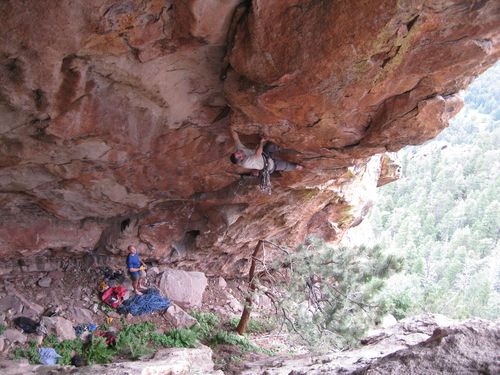��
��
1) How’d you get your start?
I got a journalism degree from UC-Boulder in 96 and thenmoved to Italy. Before leaving, I called and asked if theyneeded any news from Europe. So I became kind of a stringer for World Cup newsand the European sport-climbing scene. It built from there.
2) Was writing always a passion?
No. I was really into climbing and was going to get somekind of generic degree like sociology or communications in college. My dadsuggested I do journalism. That short conversation pushed me in this direction.
I got into climbing at 15. I started reading as much as Icould about it. Jon Krakauer’s and David Roberts’ were two classics. Read them a few times each. and were influential.
3) In the story , you write about your addictionand withdrawal from drugs while climbing. never detailed performing action sports like mountain-bikingwhile juiced. How did you approach the issue?
Yeah, he just kind of sat down and typed, didn’t he? I read which turned out not to be true. But even if it wasn’ttrue, enough of it was true. He really laid it all out there. I was able toappreciate the storytelling and directness of the prose.
Writers seem to fall into two camps when they write aboutaddiction. They’re either somewhat embracing it and poking fun at it like with his alcoholism or they’re like Burroughs, where the drugsare coursing through the writing but not necessarily on the surface. I haven’tread that many recovery or addiction narratives, per se. Especially when I wasliving it. I just didn’t want to hear anymore about it.
There aren’t that many books about (benzo)addiction. I made sure to get my hands on those. They’re mostly personalnarratives. may have beenself-published. . .
4) You used benzos to treat your anxiety. Were the drugs aslippery slope?
You can abuse Benzos like any other substance out there. Icertainly had. They kind of have a blunting, dulling effect like alcohol. Ithink it’s pretty big in poly-drug users. People coming down off this or thatwill take benzos to anesthetize themselves. I abused Valium and have beenprescribed Ativan, Klonopin, and Xanax.
If they’re prescribed for anxiety like I was taking them,they’re prescribed in multiple smaller doses throughout the day. So you don’tmegadose yourself in any kind of way that gets you high. There was no ‘Oh boy,I can’t wait to take my next pill.’ Like someone who’s fiending for a vial ofcoke or can’t wait to shoot up again. There’s definitely none of that. It wasmore like, ‘Oh shit. I’m really anxious as hell. This pill’s worn off. I guessit’s time to take another one.’ It’s not necessarily that pleasurable.
5) Why are benzos’ repercussions not better publicized?
I saw stories online of people who were shocked to findthemselves addicted. There’s this stigma. The street addict. Destitute and inthe gutter. Some people are equating this medically prescribed addiction withthat and it throws them into this state of shock and confusion.
It hasn’t been researched much in this country. If you go toEngland or Australia, there are huge advocacy groups and class action lawsuits.It seems more attention has been paid there with pharmacological research. Ithink US doctors will always tell you how bad Valium is. But there doesn’t seemto be as much awareness about the newer faster-acting drugs given for anxiety.The ones I was on. It’s hard not to suspect motivations of profit. They sellmillions of these pills. Why put a stop to the party?
6) What got you off drugs?
Once I quit Benzos, I looked at my life. I looked at thingsI didn’t want or need and were causing me anxiety. Why should I do thisanymore? I recently left my job because I was working 60-90 hours a week. Thatwould cause anyone anxiety. I decided I wasn’t going to commute. I don’t liketo fly. Instead of getting on the plane, taking a pill, and practicing mybreathing, I’m just not going to fly. I don’t need it. It doesn’t need me. I’msick of traffic jams. I’ll stay out of the cities. Exercise is a huge help.
Someone could look at this and say, ‘This guy clearly hasanxiety issues. He needs to adapt to modern life.’ Or you could look at it fromthe other angle and say, ‘The way we’re living is totally screwed up.’ Youshould just figure out what and where makes you happy. Live within thoseparameters and you won’t have to deal with these horrible sensations anymore.
Long walks with your dog are good. It sounds like a cliché,but walking with my dog for a few hours a day has been some of the best therapyI’ve found.
7) In , you state ‘On the rocks the rules wereclear and fair, the goals immediate.’ Does climbing’s requirement of totalfocus help you deal with anxiety?
For sure. My initial anxiety at 13 had to do with living ina gnarly city. When climbing, you’re away from all that. Your focus iscompletely immediate. It’s the next move. Where’s the belay? Which piece do Ineed to get in? How do I execute this? You’re in this very present-moment focusthat takes the anxiety away.
Matt Samet is a freelance writer/editor in Boulder, Colorado. He was Climbing Magazine's Editor-In-Chief from 2007 to 2010 and has been climbing since 1986.
–Stayton Bonner